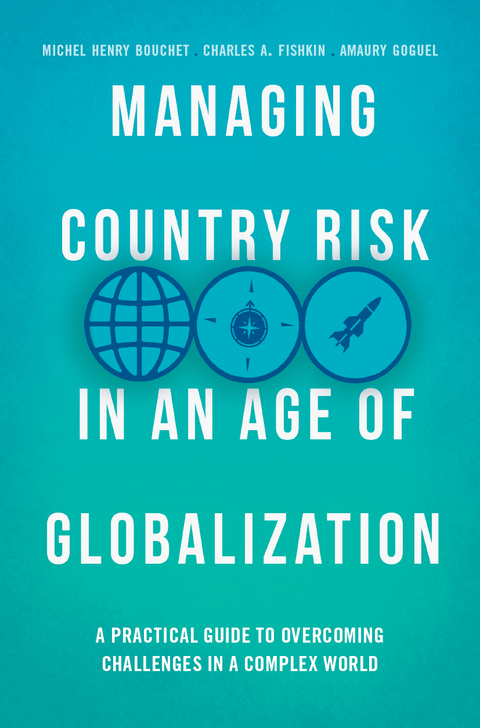
Managing Country Risk in an Age of Globalization
Springer International Publishing (Verlag)
9783030078478 (ISBN)
This book provides an up-to-date guide to managing Country Risk. It tackles its various and interlinked dimensions including sovereign risk, socio-political risk, and macroeconomic risk for foreign investors, creditors, and domestic residents. It shows how they are accentuated in the global economy together with new risks such as terrorism, systemic risk, environmental risk, and the rising trend of global volatility and contagion. The book also assesses the limited usefulness of traditional yardsticks of Country Risk, such as ratings and rankings, which at best reflect the market consensus without predictive value and at worst amplify risk aversion and generate crisis contamination. This book goes further than comparing a wide range of risk management methods in that it provides operational and forward-looking warning signs of Country Risk. The combination of the authors' academic and market-based backgrounds makes the book a useful tool for scholars, analysts, and practitioners.
Michel Henry Bouchet is currently Distinguished Finance Professor at SKEMA Business School as well as strategy adviser. He has held senior positions at BNP, the World Bank, and the Institute of International Finance. He also served as CEO of Owen Stanley Financial SA. and as senior adviser for ING Barings. Bouchet graduated in Economics from the University of Paris X and from the Paris Institut d'Etudes Politiques. He also holds a Master and Ph.D. in International Relations from University of South Carolina. He received his HDR from University Paris-Dauphine. Charles A. Fishkin has held senior positions across the spectrum of financial services, spanning a career of 30 plus years. He led the first agency wide risk management program at the United States Securities and Exchange Commission, serving as the Director of the Office of Risk Assessment. He is the author of The Shape of Risk: A New Look at Risk Management (Palgrave 2006). He is an adjunct faculty in the Masters Program in Financial Engineering at Bernard M. Baruch College of The City University of New York. He has a BA in Economics, with General Honors, from The University of Chicago. Amaury Goguel is the scientific Director for the MSc Financial Management and Investment (FMI) program at SKEMA Business School in Paris. He was previously head of SKEMA's MSc in Corporate Financial Management (CFM). Goguel holds a Ph.D. in Economics from Lille University. He also holds master's degrees from the College of Europe (Bruges), Paris 1 Sorbonne, and Complutense University of Madrid. He served as a consultant on global finance, European affairs, and political parties.
Foreword by Tanya Beder.- Introduction.- Chapter 1: Assessing Risk in a Global Economy.- Chapter 2. What is Country Risk?.- Chapter 3. Country Risk in the age of Globalization: Cycles and Dynamics: A review of Literature.- Chapter 4. Country Risk Assessment: the key role of official information sources.- Chapter 5: Country Risk Assessment: The role of private sources of market and economic intelligence.- Chapter 6. Volatility, spillovers, and crisis contamination: The new dynamics of countr risk since the 1980s and 90s in the globalized market economy.- Chapter 7. Fragility and vulnerability of integrated areas.- Chapter 8. At the root of country risk: The balance of payments from liquidity to solvency crisis.- Chapter 9. Root Causes and Consequences of Political Risk: Defining Political Risk and its Various Dimensions.- Chapter 10. The Root Causes and Consequences of Political Risk: From Bad Governance to Wealth and Political Power Concentration, and Social Instability.- Chapter 11. Why Emerging Markets do not hold a monopoly on Country Risk in the XXI° century: An analysis of monetary and systemic risks in the OECD and in the Euro-zone.- Chapter 12. External debt sustainability: From liquidity tensions to solvency crisis.- Chapter 13. In search of early warning signals of Country Risk: Focusing on market price signals.- Chapter 14. In search of early warning signals of Country Risk: Focusing on Capital Flight.- Chapter 15. Country Risk Mitigation Strategies.- Chapter 16. Glossary: The 200 most important terms and concepts for country risk managers.- Conclusion.- Afterward by Florencio de Silanes.
"This book succeeds better than any other I know in being a comprehensive and practical guide to the economics of country risk analysis. Financial institutions would do well to have a copy in the library. For beginning country risk analysts, it is a must-read." (Sam Wilkin, Journal of Risk Management in Financial Institutions, Vol. 12 (2), 2019)
| Erscheinungsdatum | 05.03.2022 |
|---|---|
| Zusatzinfo | XXVII, 527 p. 86 illus., 53 illus. in color. |
| Verlagsort | Cham |
| Sprache | englisch |
| Maße | 155 x 235 mm |
| Gewicht | 842 g |
| Themenwelt | Wirtschaft ► Betriebswirtschaft / Management ► Allgemeines / Lexika |
| Wirtschaft ► Betriebswirtschaft / Management ► Finanzierung | |
| Wirtschaft ► Betriebswirtschaft / Management ► Unternehmensführung / Management | |
| Wirtschaft ► Volkswirtschaftslehre ► Makroökonomie | |
| Schlagworte | Contagion • country risk analysis • Debt Crisis • Debt Restructuring • Domestic macroeconomic risk • Early Warning Indicators • Emerging Markets • Financial Crisis • Geopolitical risk • liquidity • Political Instability • Political Risk • Risk Management • solvency • Sovereign Bonds • Sovereign Risk • systemic risk • Transfer Risk • Volatility |
| ISBN-13 | 9783030078478 / 9783030078478 |
| Zustand | Neuware |
| Informationen gemäß Produktsicherheitsverordnung (GPSR) | |
| Haben Sie eine Frage zum Produkt? |
aus dem Bereich


